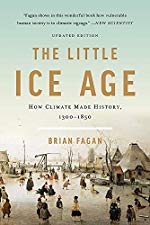The Little Ice Age
January 3, 2020 8:53 AM - by Brian Fagan - Subscribe
The Little Ice Age tells the fascinating story of the turbulent, unpredictable, and often very cold years of modern European history. Using sources ranging from the dates of long-ago wine harvests and the business records of medieval monasteries to modern chemical analysis of ice cores, renowned archaeologist Brian Fagan reveals how a 500-year cold snap began in the fourteenth century. As Fagan shows, the increasingly cold and stormy weather dramatically altered fishing and farming practices, and it shaped familiar events, from Norse exploration to the settlement of North America, from the French Revolution to the Irish potato famine to the Industrial Revolution.
Now updated with a new preface discussing the latest historical climate research, The Little Ice Age offers deeply important context for understanding today's age of global warming. As the Little Ice Age shows, climate change does not come in gentle, easy stages, and its influence on human life is profound.
Thank you for the recommendation on a subject of interest to me, history that is explicitly not based on "great man theory". I have requested it from my library and will return to this page when I have read it.
posted by Botanizer at 1:39 PM on January 3, 2020 [1 favorite]
posted by Botanizer at 1:39 PM on January 3, 2020 [1 favorite]
As I understand it, there's thought that we'd be in an actual ice age at this point, if it weren't for all of the CO2 we put in the atmosphere.
posted by Chrysostom at 10:11 PM on January 3, 2020
posted by Chrysostom at 10:11 PM on January 3, 2020
We are still a few thousand years away from when variations in the Earth's orbit around the sun will drive us into a period of glacial advance. To get a glacial advance the orbital variations, eccentricity of the orbit (~100K year cycle), the tilt of the earth on it's axis (~41K year cycle), and the changing date of when the earth is closest to the sun (~23K year cycle) have to line up to produce the maximum amount of solar radiation in the Northern Hemisphere summer and that is a few millennia away. For example, perihelion (when the earth is closest to the sun) occurs tomorrow, Jan 5th and won't precess back to July/Jun for another 12,000 years.
One thing to note, "Ice Age" is a term that is used differently by scientists and the public. When geologists or climatologists refer to the Ice Age they are typically referring to the Quaternary, which is a cold period of geologic time that began 2.6 million years ago and which is still ongoing. Within the Quaternary there have been a number of glacial and interglacial periods. The most recent glacial advance, which peaked about 16K years ago and ended 11K years ago, is what most people are thinking of when they say "Ice Age".
I read Fagan's book when it came out and mostly remember that is it a well-written popularization of the then current understanding of the Little Ice Age. A lot of research has taken place since then.
Finally, Fagan based a lot of his book on The Little Ice Age, an academic book from 1988 by Jean Grove, which Fagan reviewed in this 2008 "revisit" (that pdf should be open access. If not MeMail me).
posted by plastic_animals at 6:33 AM on January 4, 2020 [5 favorites]
One thing to note, "Ice Age" is a term that is used differently by scientists and the public. When geologists or climatologists refer to the Ice Age they are typically referring to the Quaternary, which is a cold period of geologic time that began 2.6 million years ago and which is still ongoing. Within the Quaternary there have been a number of glacial and interglacial periods. The most recent glacial advance, which peaked about 16K years ago and ended 11K years ago, is what most people are thinking of when they say "Ice Age".
I read Fagan's book when it came out and mostly remember that is it a well-written popularization of the then current understanding of the Little Ice Age. A lot of research has taken place since then.
Finally, Fagan based a lot of his book on The Little Ice Age, an academic book from 1988 by Jean Grove, which Fagan reviewed in this 2008 "revisit" (that pdf should be open access. If not MeMail me).
posted by plastic_animals at 6:33 AM on January 4, 2020 [5 favorites]
I haven't read this, but I greatly enjoyed Nature's Mutiny: How the Little Ice Age Transformed the West and Shaped the Present by Philipp Blom, which is a little too digressive for some but covers an extraordinary breadth of history.
posted by adrianhon at 1:57 PM on January 5, 2020
posted by adrianhon at 1:57 PM on January 5, 2020
You are not logged in, either login or create an account to post comments

posted by Homo neanderthalensis at 8:59 AM on January 3, 2020 [3 favorites]